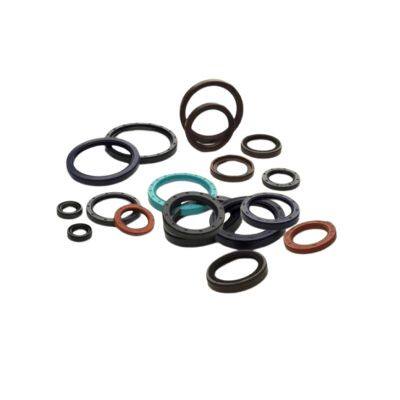Product Details
Product Description
Product Description
Oil seals are critical components in various mechanical systems. Their primary function is to prevent the leakage of lubricants and the ingress of contaminants, thereby ensuring the efficient and reliable operation of machinery. One of the key performance criteria for oil seals is their wear resistance. The material composition of these seals plays a pivotal role in determining their durability and effectiveness. This article explores the different materials used in the manufacturing of oil seals, focusing on their wear-resistant properties.
Types of Materials Used in Oil Seals
Nitrile Rubber (NBR):
Nitrile rubber, also known as Buna-N, is one of the most commonly used materials for oil seals. Its popularity stems from its excellent resistance to oil, fuel, and other chemicals. Additionally, NBR exhibits good wear resistance, making it suitable for applications involving moderate to high-speed rotations. However, its performance may degrade at higher temperatures or in the presence of certain chemicals.
Fluorocarbon Rubber (FKM):
Fluorocarbon rubber, widely known by the brand name Viton, is renowned for its superior chemical resistance and high-temperature tolerance. FKM seals offer excellent wear resistance, making them ideal for harsh environments where they may be exposed to aggressive chemicals, high pressures, and temperatures up to 200°C. Their durability ensures long service life even under demanding conditions.
Silicone Rubber (VMQ):
Silicone rubber is prized for its flexibility and wide operating temperature range, from -60°C to 200°C. While silicone seals provide good wear resistance, they are generally used in applications where extreme temperatures are a concern, rather than for their abrasion resistance. They are not recommended for use in applications involving petroleum-based fluids due to swelling and degradation issues.
Polytetrafluoroethylene (PTFE):
PTFE, commonly known as Teflon, offers outstanding chemical resistance and the lowest coefficient of friction among all seal materials. Its wear resistance is exceptional, particularly in dry running conditions or where lubrication is minimal. PTFE seals are often used in applications where low friction and high wear resistance are paramount, such as in aerospace and high-precision machinery.
Polyurethane (PU):
Polyurethane seals are known for their exceptional toughness and abrasion resistance. They can withstand high pressures and provide excellent wear resistance, making them suitable for hydraulic and pneumatic applications. However, their performance can be compromised at higher temperatures, limiting their use in extreme conditions.
Factors Influencing Material Choice
The choice of material for oil seals depends on several factors:
Operating Environment: The presence of chemicals, temperature extremes, and the type of lubricant used can significantly influence material selection.
Speed and Pressure: High-speed applications require materials with low friction and good wear resistance to minimize heat generation and wear.
Compatibility: The material must be compatible with the fluids it will contact to avoid swelling, degradation, or loss of sealing properties.
Cost and Availability: While performance is critical, cost and material availability also play important roles in the selection process.
Innovations in Wear-Resistant Materials
Recent advancements in material science have led to the development of composite materials and specialized coatings that enhance the wear resistance of oil seals. For instance, incorporating carbon or glass fibers into rubber compounds can significantly improve their abrasion resistance. Similarly, advanced coatings like Diamond-Like Carbon (DLC) or ceramic coatings can be applied to seal surfaces to reduce wear and extend the service life.
The choice of material for oil seals is a critical factor in determining their wear resistance and overall performance. While traditional materials like NBR, FKM, and silicone rubber offer good wear resistance, innovations in composite materials and advanced coatings promise even better performance in challenging environments. The future of oil seal technology lies in the continuous improvement and optimization of material properties to meet the ever-increasing demands of modern machinery.
>>
Commercial Flour Mixer for Professional Bakery and Pizza Dough Making
>>
DA300 Diamond Wire Saw for Cutting Sapphire
>>
PIU Series 0.01% Grade high precision DC Tester
>>
Hot Selling Black Color 2.4GHz Wireless Mouse with Nano Receiver for Laptop PC Computer Tablet Mac MacBook
>>
Haichen 600 Tons Cheap Plastic Bucket Making Machine
>>
2021 Diamond Button Bit Recycling Grinding Wheel for Secoroc Grind Matic
>>
Regeneration smelting furnace equipment Tongchuang supply small gas crucible furnace
>>
VGA Vertical Install Tempered Glass Gaming Computer Case ATX3.0 Full Tower Computer Case
>>
New Small Seagull/OEM Wooden Case 0.25t-10t Lifting Equipment Crane Hoist
>>
SLC TMC 7 Series RFID Safety Switches,Non - Contact,Magnetic Holding
>>
Wholesale Manufacturer Peanut Sheller Groundnut Shelling Machine
>>
Gold Mark cnc laser cutting machine sheet metal with exchange table
>>
Automatic Feeding Sheet Metal Hydraulic Gantry Shears
>>
Tai Gk402 for Sanitary Napkin Sap Super Absorbent Polymer for Baby Diaper Tai 283
>>
hot sale UPVC profile wood color PVC sliding window /doors and windows factory
>>
Laser Cleaner Graffiti Rust Removal 100W/200W/300W
>>
1300L Agricultural/Agriculture Farm Tractor Fogging Pesticide Pump Boom Spraying/Spray /Sprayer Machine for Corn/Rice/Cotton/Wheat/Soybean/Sugarcane/Pineapple
>>
HC-I006A China Advanced Medical Folding obstetric table/gynecology examination chair/gynecology examination table
>>
Air Filter Synthetic Fiber Filter Roll Floor Filter Power Plant Industrial Pre Filter Roll
>>
Hoosun High-Speed Agitator Dissolver for Battery Ceramics Nanomaterials Coatings
